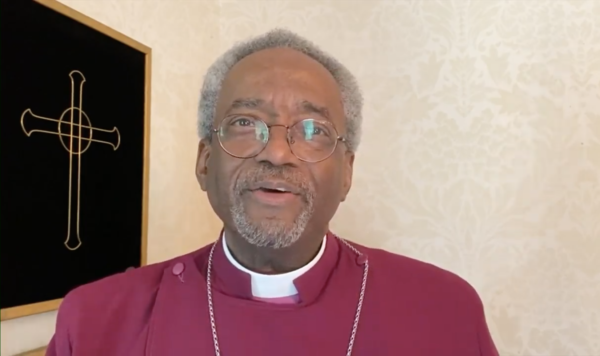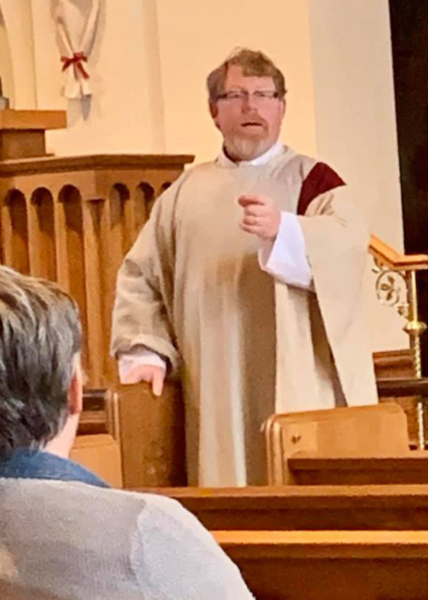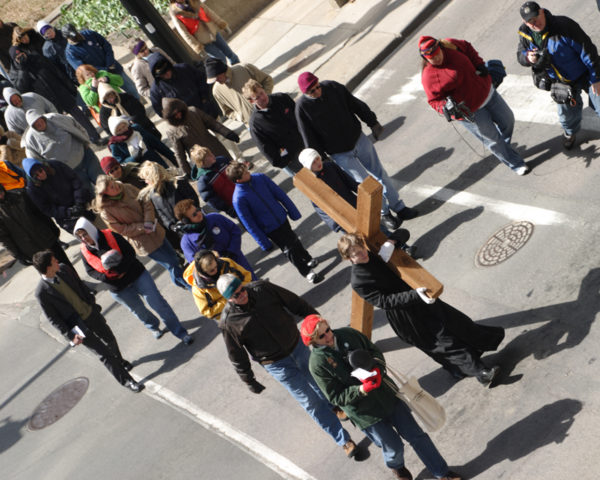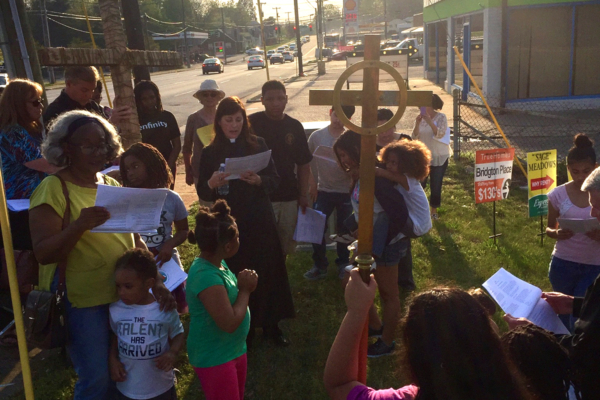Pandemic to upend Holy Week, Easter liturgies as Presiding Bishop urges halt to in-person worship'Suspension of in-person public worship is generally the most prudent course'Posted Mar 17, 2020 |
|
[Episcopal News Service] Presiding Bishop Michael Curry issued a letter to The Episcopal Church on March 17 stating in his clearest language yet an unsettling truth that many Episcopalians already had begun to acknowledge: Lent, under the threat of global pandemic, will culminate in a Holy Week and Easter Sunday unlike any before – with churches closed and pews empty.
“It is reasonable to assume that some form of recommendations restricting public gatherings will continue for some time,” Curry said. “Considering this changing landscape, I believe that suspension of in-person public worship is generally the most prudent course of action at this time, even during Holy Week and on Easter Day.”
COVID-19, commonly known as the coronavirus, had spread to 150 countries and was blamed for more than 6,600 deaths, with 168,000 cases worldwide, the World Health Organization reported as of March 16, and the numbers in the United States have been increasing rapidly in the past week. Curry, in his letter to the church, alluded to the Centers for Disease Control and Prevention’s recommendation against gatherings of more than 50 people for the next eight weeks, and the White House urged even smaller gatherings of 10 or fewer for the next two weeks.
Episcopal News Service’s complete coronavirus coverage can be found here.
The Episcopal Church’s online resource page for coronavirus response is here.
After voicing his support last week for bishops who move to cancel in-person worship services, Curry reaffirmed and strengthened that encouragement, as well as efforts underway to offer Episcopalians ways of worshipping together online.
“It is important to emphasize that suspension of in-person gatherings is not a suspension of worship. I very much encourage and support online worship,” Curry said.

Presiding Bishop Michael Curry preaches during Washington National Cathedral’s livestreamed Eucharist on March 15, 2020. Photo: Washington National Cathedral
The presiding bishop’s latest statements, coupled with the myriad directives and pastoral letters issued over the past several days by bishops across the church’s 111 dioceses and mission areas, underscore how the coronavirus outbreak and efforts to slow its spread have thoroughly upended normal parish life and the liturgical practices that Episcopalians previously took for granted.
Public health officials stress that until a vaccine is developed and available – possibly not for another 12 to 18 months – larger gatherings could accelerate transmission of the coronavirus at a pace that would overload hospitals, as has happened in Italy. Many Episcopal bishops already had asked congregations in their dioceses to cancel in-person worship services starting last weekend, from Washington, D.C., to San Francisco, California. More bishops followed suit starting this week.
Fond du Lac Bishop Matthew Gunter was among those bishops who last week allowed his congregations to proceed with worship in their churches, but he advised precautions, such as spreading out in the pews, avoiding contact at the Peace, and refraining from intinction, the dipping of the bread in the wine.

The Rev. Chris Arnold preaches at Trinity Episcopal Church in Oshkosh, Wisconsin, where he is rector. Photo: Trinity Episcopal Church, via Facebook
On March 15, the Rev. Chris Arnold, rector of Trinity Episcopal Church in Oshkosh, Wisconsin, stood face to face with his congregation for what he suspected would be the last time for a while. In his sermon, Arnold didn’t talk at all about the lectionary readings. He talked about the coronavirus.
“What I was hoping to do was introduce people to the range of possibilities and leave them with some word of hope,” Arnold told Episcopal News Service.
The next day, on March 16, Gunter responded to the worsening outbreak by calling on Trinity and the diocese’s other congregations to stop offering worship services in their churches. Instead, Gunter encouraged Episcopalians in the northeastern Wisconsin diocese to view the livestreams of services at Grace Episcopal Church in Sheboygan, St. Thomas Episcopal Church in Menasha or Intercession-Beloved Community in Stevens Point.
It’s “like the ultimate Lent,” Arnold said after Gunter’s announcement. “What greater fast is there than a fast from the Eucharist?”
The thought of how to celebrate Holy Week and Easter, however, clearly troubles him.
“I have no idea what we can do as a church for Easter. I don’t know what the answer to that is,” Arnold said. “Somehow, the whole church will find a way to make this experience the Easter story.”
The Rev. Gillian Barr has been of similar mind in considering what this moment means for her congregation at Calvary Episcopal Church in Stonington, Connecticut.
“I think that, this Lent, we will be walking the Way of the Cross and the way of the Holy Week more profoundly than we have in a long time, as the culture and as the congregations,” Barr said in a phone interview.
Connecticut Bishop Ian Douglas had strongly encouraged congregations to cancel services in a March 15 message, while citing his diocese’s canons that leave final decisions to local leaders. Barr and the Calvary vestry agreed March 14 in the evening that cancellation was warranted and began notifying the 100 or so parishioners who typically worship at the church’s two Sunday services.

The Episcopal Cathedral of St. Paul is one of four Christian congregations in downtown Des Moines, Iowa, that have organized a Way of the Cross procession each year for more than a decade. Photo: William J. Gentsch
On March 15, with one of the wardens standing outside the church turning people away, Barr was inside with a lector and an intercessor during the 8 a.m. and 10 a.m. services, which were broadcast by a preexisting conference call setup. On most Sunday mornings, you can count on one hand the number of parishioners who listen to the service by phone, but this morning, 29 people called in. The response was largely positive.
“A lovely surprise,” parishioner Patty Copp said in an email that Barr shared with ENS. “I pictured myself in my favorite pew, had my old Prayer Book on my lap and joined in the service. … I felt amazingly complete at the close of the Service!”
But Barr also is bracing herself for a worst-case scenario, including the possibility that some of her parishioners may succumb to COVID-19 before the congregation is able to gather again in person.
“I think that will shape what Holy Week and Easter look like,” Barr said. Even before then, “we’re going to see some Good Fridays.”
The Rev. Scott Gunn, executive director of Forward Movement, was scheduled to preach March 15 at Calvary Episcopal Church in Pittsburgh, Pennsylvania, but he decided to cancel his trip in response to the developments last week in the coronavirus’s spread. Calvary, like many other congregations, chose to cancel its in-person worship services.
And while the NCAA’s March Madness basketball tournament has been canceled, Forward Movement’s Lent Madness, featuring a bracket of saints, is still going strong. It offers a bit of mirth to take Episcopalians’ minds off the bad news for a little while, said Gunn, who coordinates Lent Madness with the Rev. Tim Schenck, rector of St. John the Evangelist Episcopal Church in Hingham, Massachusetts.
But there’s no avoiding the fact that this Lent will be like none other.
“I think it’s going to be a very different Holy Week and Easter than probably any of us have ever experienced,” Gunn said, noting the growing realization across the church that the biggest Sunday on the liturgical calendar likely will pass this year with empty pews. “I think, if anything, there’s an opportunity in this because, when you pare away all of the trappings and also all of the traditions and customs, maybe we’re going to have no choice but to focus on what’s really important about the celebration of Holy Week.”

The Rev. Chantal McKinney leads worshippers from Christ’s Beloved Community in an outdoor Good Friday procession in Winston-Salem, North Carolina. Photo: Christ’s Beloved Community
The soaring hymns? The flowers in bloom on the altar? The grand Easter Sunday processions? “I really hope we get to do that in 2021,” Gunn said. But even without those trappings, “we still are left with the most amazing story in history, and nothing can take that away.”
Arnold, the Oshkosh rector, also is trying to put this year’s Holy Week and Easter in perspective. “The first Easter, Jesus slips out of the tomb, and it’s not like there’s a big crowd there celebrating. He rises from the dead almost unnoticed.”
Whether gathered together or connecting from a distance, Arnold is confident the church will find a way to celebrate the resurrection. Easter will happen.
“Emotionally, as a priest and as a Christian, as a pastor of a congregation and as someone who loves the Eucharist, it’s going to be really hard,” Arnold said. “But I’m also a really strong believer that Christianity, it helps us to do hard things. … Hopefully, it’s meant to make us brave.”
– David Paulsen is an editor and reporter for Episcopal News Service. He can be reached at dpaulsen@episcopalchurch.org.

Social Menu